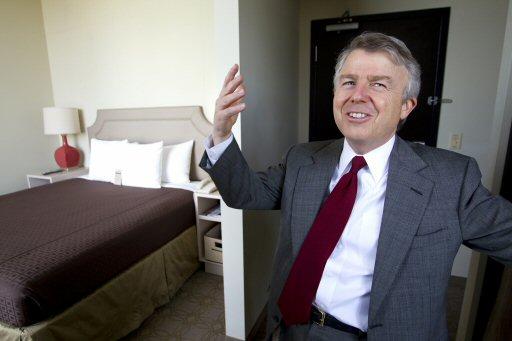Hotelier Does Business with Heart
Staff Writer, News & Record, Greensboro, North Carolina
Originally posted October 31, 2011
GREENSBORO — When the president slept overnight at the Proximity Hotel, drawing Occupy Greensboro protesters and stopping traffic outside the country’s greenest hotel, Dennis Quaintance went into overtime thinking of the others.
That would be the night’s other guests.
“We didn’t want anyone to say, ‘Why am I paying to stay here in this mess?’” Quaintance, a partner in the luxury hotel, recalled as he pulled back drapes in the two-room suite the president used. “All our guests are our highest priority.”
That also is the way the focused but energetic businessman approaches people in other aspects of his life, and this year it earns him the Brotherhood/Sisterhood Citation Award. The award is the highest individual honor given by the National Conference for Community and Justice of the Piedmont Triad. The award will be given during a nearly sold-out dinner gala Thursday.

NCCJ Award winner Dennis Quaintance at the Proximity Hotel, in the suite where Obama stayed.
Quaintance was nominated for embracing the group’s mission of fighting bigotry, bias and racism — even before it was broadly viewed as the responsible thing to do.
“I think what is unbelievable about Dennis is that he’s been able to hard-wire diversity and inclusion into the DNA of his business practices,” said Susan Feit, executive director of the NCCJ. “It’s not only the way he lives his life but the way he does his business.”
Two decades ago, he and his business partner, Mike Weaver, added a zero-tolerance policy for bigotry at the upscale Quaintance-Weaver Restaurants and Hotels properties — defining bigotry as discrimination for any “off-purpose” reason, including race, gender, age, religion, national origin or sexual orientation.
Being proactive while maintaining high standards, he said, helped attracted the best and the brightest in the workforce.
He also recruited hearing-impaired people — a community he felt didn’t always get a fair chance — to work in the laundry when the Proximity Hotel opened.
Quaintance supports groups and efforts that focus on fostering all forms of equality.
“He uses his position and the power he’s afforded because of his success to champion some of those things,” said civic leader Ivan Canada, who also is chairman of the Guilford Green Foundation, which raises money for gay causes.
“A lot of corporate leaders aren’t willing to go out on that limb.”
Even as a boy, young Dennis had the makings of an entrepreneur.
By age 7, he was seeking out interesting sedimentary rocks in the desert, and selling them as “wonder stones” along the desolate stretch of Nevada where he lived.
He inherited his entrepreneurial spirit from his father, an auto mechanic and would-be inventor, among other things. The father’s most eye-catching creation was The Car Bar — a device that pumped beverages from a cooler in the truck to an array of push-button spigots in the dash. Dennis’ mother worked at a Kmart. Their working-class family, which included five children, moved several times.
The marriage broke up when Dennis was 13, and tough times followed.
By that age, Dennis had begun to notice the gender bias toward his mother at her job at a grocery store. His mother didn’t complain — probably couldn’t complain.
“I didn’t know the term, but I knew it wasn’t right,” Quaintance said. “I think we still have a lot of work to do globally in the area of gender bias. People should be seen as people.”
His mother, Marita Moles, now in town to see her son receive the award, became his strongest influence.
“She just really drilled into me that the way you gain respect is by being reliable — do what you say you are going to do and say things even when they are not convenient for you to say them,” Quaintance said.
Quaintance later got a full-time job as a housekeeper’s helper at a hotel in town at the age of 15. He found he was good at hospitality, eventually serving in a variety of roles at different hotels, with each one a higher pay grade than the last.
Quaintance moved to Greensboro in 1979 to help a friend open Franklin’s Off Friendly. He also met and married the former Nancy King, who also was busy, helping her employers start up multimillion-dollar hotels.
Quaintance teamed up with Mike Weaver to form Quaintance-Weaver in 1988, becoming the visionary behind the Proximity and O.Henry hotels, and several restaurants, including Lucky 32, which was named after his father’s race car. His wife, who he calls his best friend, soul mate and equally committed to treating others with respect, would later join the company as vice president.
Weaver and Quaintance were having lunch at Lucky 32 when Weaver mentioned the lack of diversity among the staff.
“I so wanted to say, ‘Not many have applied,’ but I didn’t,” said Quaintance, who knew he had rightly considered applicants. “I was defensive. Then it started bugging me.”
He approached African American employees, guests and friends, asking if they had qualified people they could recommend.
“I thought that would somehow be offensive to someone — just because I’m short doesn’t mean I have short friends,” Quaintance said. “So I said, ‘This is an honest thing.’”
The experience taught him to never think he’s done enough.
“So what if you had a good inning, if the game isn’t over,” Quaintance said.
He recalls attending a diversity gathering at Bennett College years ago, and listening along with then-President Johnnetta Cole, as the diversity officer of a large grocery store chain told of the company’s chief executive officer coming into a meeting, brushing the table, and simply saying “same-sex benefits.”
Someone there asked Quaintance whether his company offered same-sex benefits.
“I said, ‘No, no one’s asked,’” Quaintance said. “Dr. Cole said, ‘They’d have to ask?’ The next day we had a key team meeting. I said (hand brushing against table), ‘Same sex benefits in a week.’ I said, ‘I don’t want to know what it costs and who signs up for it.’”
Cole, now director of the Smithsonian’s National Museum of African Art, says it is difficult for her to find words that can adequately capture the depth of Quaintance’s commitment to doing his part to help build what the Rev. Martin Luther King, Jr., called the beloved community.
She mentioned the policies and practices of his company, his work as a community activist, his personal thoughts and actions, the way he parents his children and his day-to-day interactions with everyone he meets.
“Dennis honors the Native American expression that says: With all beings and things we must be kin,” Cole said.
When President Barack Obama slept at the Proximity, a hotel built to look like an old factory converted into a hotel, he also stepped onto environmentally friendly elevators that generate electricity as they descend, and washed his face using hot water heated by solar-powered water heaters.
The room has stylish black-and-white bathroom tiles made of recycled materials and energy-efficient fluorescent lighting softened by fabric shades.
The Proximity is the first in the hotel industry to win platinum status from the nation’s arbiter of environmental and energy efficiency, the U.S. Green Building Council.
But the art in the room came from Chip Holton, a local artist who was put on salary for six months to create pieces to display throughout the hotel. The CD in the player was from Greensboro-based singers Evan Olson and Jessica Mashburn. Quaintance also can tick off who fashioned the drapes and designed the carpet.
“We looked at everything through a sustainability lens,” Quaintance said. “We also wanted to put local people to work.”
This is just another example of the way he has sought out lives to touch, say the people who nominated him, including Canada, a former employee, businesswoman Denny Kelly and philanthropist Jeanne Tannenbaum.
“When our children were born, Nancy and I realized legacy is not an ego trip, it’s a fact of life,” Quaintance said.
He said they began to approach life using the perspective of someone looking back 10 generations.
“We came up with, ‘Why did your generation use so much nonrenewable energy, because we are just as prosperous using a fraction?’ ‘What about people being treated differently because of race and gender?’
“Do we really feel like 10 generations from now they’re going to say, ‘You really handled that well?’”
Contact Nancy McLaughlin at 373-7049 or [email protected]
See the article at news-record.com.
